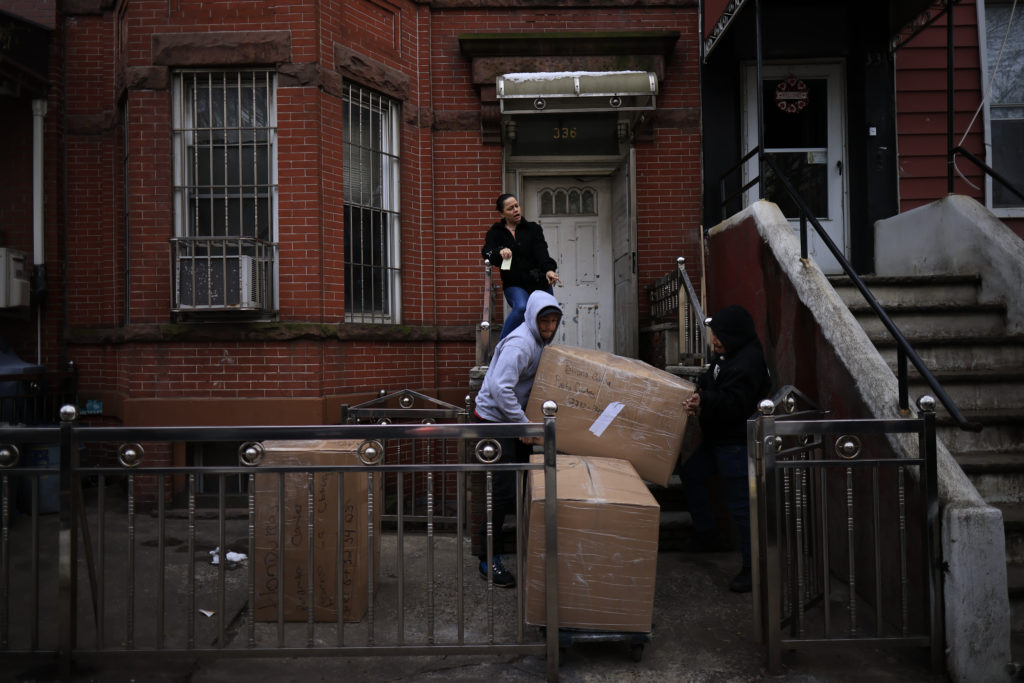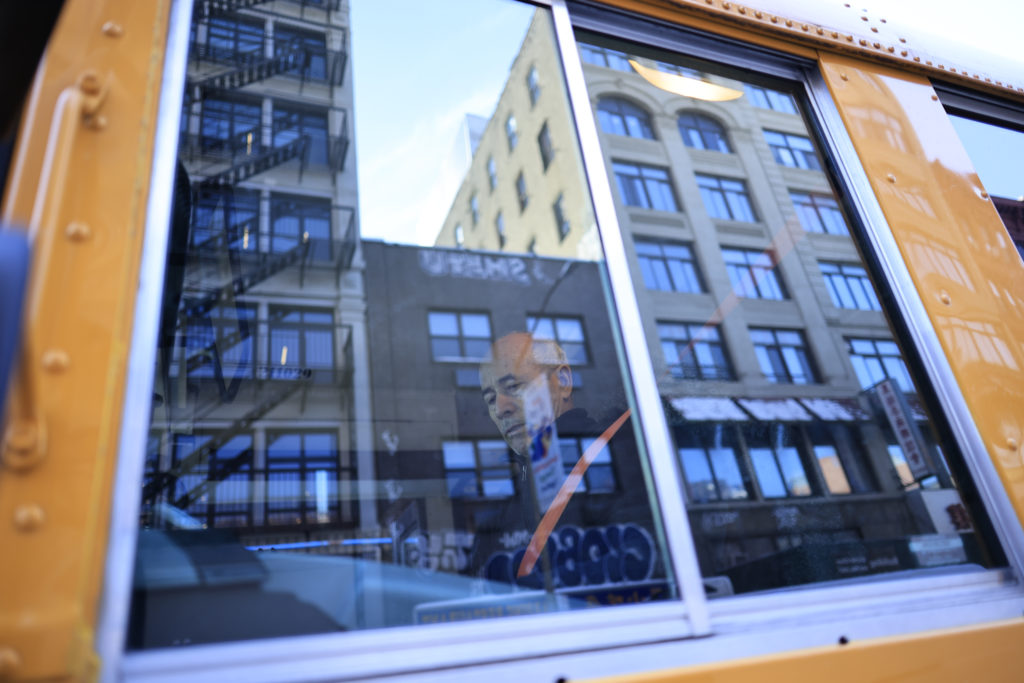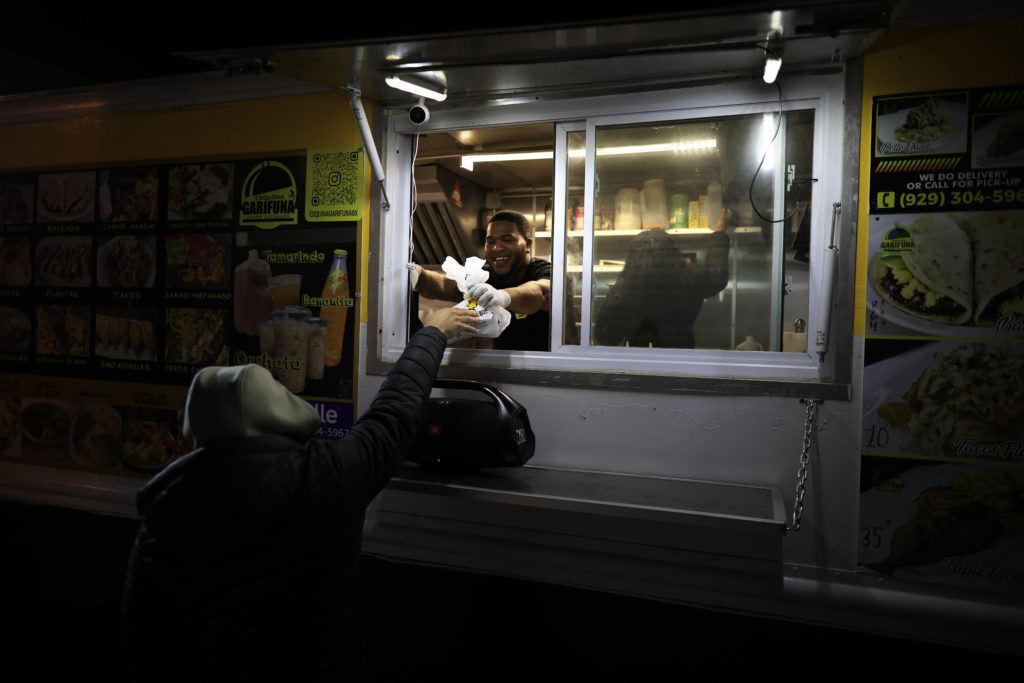Photography and text by: Jorge Cabrera
English edit and translation: Amy Patricia Morales
Situated on one side of the train tracks in the Bronx is La Esquina Garífuna, a food truck specializing in traditional Honduran cuisine. Owned by José Manuel, a Garífuna who migrated to the United States a decade ago with his wife to escape the political turmoil in Honduras. Despite being in an unassuming location amid a chilling -4°C, the welcoming atmosphere created by José makes you overlook the constant noise of passing trains every five minutes and the litter from nearby residents.
The financial decline of José Manuel’s family began in 2009, amid the coup d’état against then-President Manuel Zelaya Rosales. Having migrated to Tegucigalpa during those years and actively participating in protests supporting the president, the political turmoil resulted in him losing his job. Faced with limited opportunities due to the circumstances, he opted to establish a food stand featuring Garifuna flavors. Unfortunately, he experienced another setback, losing everything to extortion by local gangs. In 2014, recognizing the challenges, he and his wife decided to immigrate to the northern United States, joining the path taken by many in pursuit of a better future.
“Thankfully, we’re here, operating our business legally, and providing for five families,” remarked José Manuel.
Meanwhile, after several delays, the trial against former president Juan Orlando Hernandez, who was extradited on charges of drug trafficking conspiracy, began on February 20, 2024. Hernandez entered the court of the Southern District of New York at around 9:30 a.m., wearing the suit used for his presidential inauguration. The speeches in which the former president invoked the indomitable Lempira, hero of the Honduran indigenous resistance, are long gone.
For many Hondurans, his arrest signified progress for democracy in the country. On February 15, 2022, Hernández was arrested at his home following the extradition request filed by the U.S. government. The awaited trial brings the hope of a verdict that will eliminate at least 1% of corruption in the country with the five stars. José Manuel remains hopeful, but is concerned about the delay in the process.
“I have been attentive to the trial, and just like me, many of us are with one eye open and the other closed. I hope that justice is done for our people. We have suffered, we have fled, we have seen violence, we have lost our loved ones, and all because of drug trafficking. This is the trial, we did not win a world cup, but if we get rid of corruption, we are satisfied,” he said.
For all Hondurans inside and outside the country, this would be the trial of the century, but for New Yorkers the event goes unnoticed. A few meters away from the Southern District court, Donald Trump, former president of the United States, was called to the Manhattan criminal court for his initial hearing in the Stormy Daniels case. The police presence spanned over five blocks, and there were so many media representatives that reporters had to be confined to a designated area to prevent anyone from moving around.
The two people who are sitting in the dock today held the same political position, but the country they governed makes a big difference. One of them (JOH) passes for one more defendant in the United States, compared to Trump.
“I regret that Donald Trump has been successful in delaying the justice system. That has been his tactic throughout his life, but most of the cases brought against him have been successful. My hope is that justice will be achieved in this case as well,” said Robert Croonquist, a protester who showed up at the court.

Historian Fanny Julissa Garcia immigrated to the United States from Honduras with her mother at the age of 10. Currently, her role involves conducting interviews and working with migrants willing to document their immigration history, assisting them in the asylum application process. States like Texas, Arizona, and Florida coordinate the transportation of migrants, primarily from South and Central America, using buses to bring them to sanctuary cities such as New York, Boston, and Colorado.
The so-called “sanctuary cities” are committed to offering services to migrants, without turning any of them away. In New York, these services allow them to obtain an identification card to receive help and be able to move within the city that never sleeps.
“It’s not a driver’s license, but it’s an identification and that helps. Many states don’t have that. Here in New York there are certain resources that help migrants settle; there is also a law or commitment by the city to always offer housing to someone who asks for it, as well as medical insurance,” García explained.
According to the historian, if migrants persist in arriving at the sanctuary city, it will become unmanageable for the U.S. government. Those arriving do not meet the criteria for a work permit, yet they qualify for services without making contributions to the city.
“The migrants themselves complain that they are not allowed to work, and even if they are given other services, they themselves don’t want anything given away. They just want to work, and the only way to get a work permit is to apply for political asylum, but this is based on very strict laws, including criteria like credible fear or persecution in the country of origin,” she said.
Every year, thousands of Hondurans leave their homeland with the idea of coming to the United States in search of better living conditions to escape the pervasive poverty and violence that plague Honduras. It is estimated that one million Hondurans live in the United States, between legal and irregular residents; some 55,000 are based in New York.
Garcia points out that the limited information migrants bring, combined with the state’s restrictions on promoting two Internal Revenue Service (IRS) programs, hinders migrants from declaring their income and contributing to the state of New York. The programs in question are the Employer Identification Number (EIN), serving as a worker’s identification number, and the Individual Taxpayer Identification Number (ITIN). While not a work permit, having these two numbers would enable individuals to be employed and fulfill their tax obligations. Garcia believes the situation is unsustainable unless the government takes swift action to address these issues.
Members of the Honduran community in New York demonstrated outside the Southern District courthouse while jury selection was taking place, demanding the conviction of the former president; many of them asked for permission to miss work in order to attend the trial.

In Brooklyn, another part of the city, Yolanda Rivera from Honduras, who has been living outside her home country for two decades, works caring for the elderly. However, today, she has taken the day off to welcome Contracorriente for a visit. We discovered her waiting on the stairs of her home, feeling anxious as the delivery cart is yet to arrive. The company handling the delivery is Honduran, tasked with picking up three boxes destined for La Ceiba, Honduras. While waiting, she shares her high expectations for the trial.
“I recall that with the brother [Tony], the trial lasted about eight days. Now, we’re dealing with the kingpin of kingpins. I just hope it doesn’t prolong like it did in Honduras. I wish for a swift judgment, and if there are others implicated, they should be brought to justice too. It’s time to put these thieving drug traffickers behind bars,” remarked Rivera.
The proceedings have initiated, and millions of Hondurans are watching the trial of former president Juan Orlando Hernández. The charges leveled against him include drug trafficking and use of weapons. The court, prosecution, and defense of the ex-president have determined the initial witness to take the stand. This individual, a woman whose identity is being withheld, was the partner of Alexander Mendoza, also known as “Porky.” U.S. authorities have identified Mendoza as a leader of the Mara Salvatrucha gang in Honduras.






